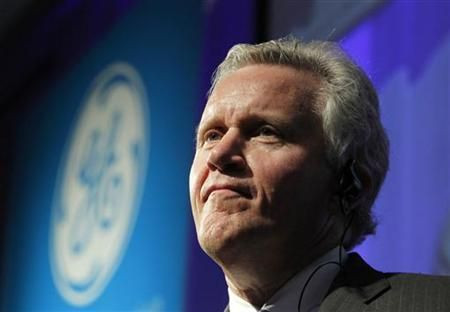General Electric Company Q2 Earnings Preview 2013: Power And Water Unit Drags Down Uninspiring Earnings, Despite Positive Long-Term Outlook

General Electric Company (NYSE:GE) appears set to report a 6.7 percent decline in its earnings per share for its second quarter, according to analysts, as a lackluster wind and water trade drags down a lucrative oil and gas equipment business.
The Fairfield, Conn., conglomerate, which deals in energy, industry, and finance, is expected to report results early Friday morning. Analysts surveyed by Thomson Reuters expect GE will report a profit of $3.6 billion, or 36 cents per share, down from $4.01 billion, or 38 cents per share, a year ago.
Revenue is expected to come in around $35.55 billion, down 2.6 percent from a year earlier.
In the past quarter, the company’s sales of oil and gas extraction equipment have done well, analysts told the International Business Times, even as its wind turbine and water-management business fared badly.
One challenge is the heavy emphasis on wind energy marketed in developed markets such as Europe, the U.S. and Japan, where there’s little growth, William Blair & Co. analyst Nicholas Heymann said.
Earlier this year, Europe experienced a “huge slowdown” in demand for the work of GE’s power and water unit, Heymann said. “Now, again, we find that power and water is behind the second-quarter’s performance.”
That analysis concurs with a research note put out Wednesday by Citi analyst Deane Dray, who said the European energy market isn’t expected to snap back after faltering in the first quarter. That’ll delay profit margin improvements at GE, he wrote.
Another key question with GE’s energy business, Morningstar analyst Daniel Holland said, is whether the company can make profits on sales of its wind turbines.
In late June, GE announced ambitious wind-turbine expansions in Brazil and Australia. In the last quarterly earnings call, CEO Jeff Immelt said GE is launching the world’s most-energy-efficient wind turbine.
“Volume is one thing, but pricing and profitability – that’s why I’m a little bit cautious,” said Holland, of an aggressive wind-turbine expansion. “The expansion is kind of a topline thought, but it depends on the price they’re able to sell the units at.
“Profitability has been the question and concern with wind at the moment. It’s kind of been the scapegoat for a lot of the earnings misses and profitability misses thus far.”
In other areas, GE’s health-care unit has suffered from lower sales and profit margins, even as its financial unit, GE Capital, has held up well under pressure, Heymann said.
In May, GE Capital launched an ambitious advertising campaign highlighting its commercial lending to medium-sized businesses, the New York Times reported, even as the parent GE looks to rely less on its financial services revenue in the long term.
The company must also digest about $15 billion worth of acquisitions by its oil and gas arm dating back to 2011, said Heymann, meaning some significant restructuring could be imminent.
A record backlog of orders from the past quarter will have little effect on the upcoming earnings announcement, analysts said.
The Paris air show in late June also delivered disappointing results for GE, Heymann said. He estimated that GE only won about one-third of commercial aircraft engine orders this year, down from its usual two-thirds share, after rival Pratt and Whitney Canada impressed customers with its latest PurePower engine.
Despite its poor performance this quarter, analysts are upbeat about GE’s outlook through the remainder of 2013 and beyond. Similarly, Dray noted that the company’s share underperformance relative to rivals in recent weeks, combined with low expectations, will likely mean a positive share price reaction after it reports earnings.
Holland expects low single-digit revenue growth for the remainder of 2013, excluding growth from acquisitions. Heymann is sticking to 11 percent EPS growth over the next three to five years.
“Oil and gas continues to be decent ….Health care, aviation, and their train business still look pretty good, just from a general health of the business perspective,” Holland said.
“GE is one of those names where it’s really more important to pay attention to the big picture, rather than chasing pennies on the quarter,” he said.
Heymann said that if GE can diversify its internal portfolio to boost industrial earnings and shrink reliance on GE capital, while tweaking profit margins, all over several years, it’ll do fine.
“The business is not by any means a train wreck,” Heymann said. “But it’s not on easy street.”
© Copyright IBTimes 2024. All rights reserved.





















